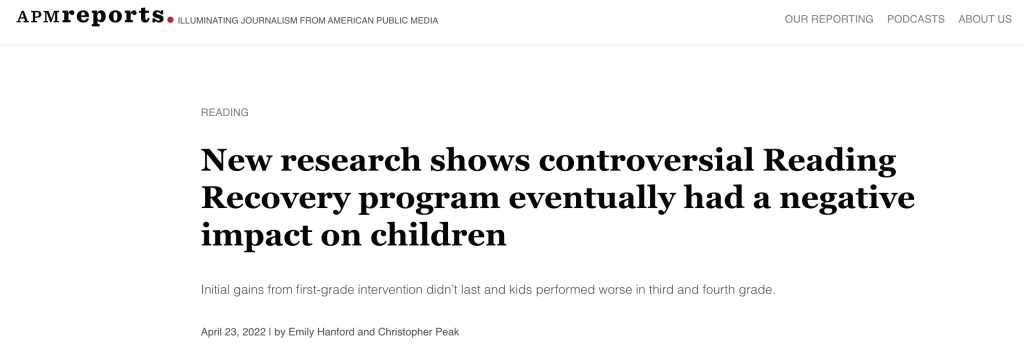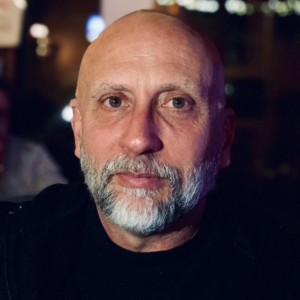BLOG
“Science of Reading” Media Advocacy Continues to Mislead
by Paul Thomas
Originally published April 24, 2022. Republished with permission by Paul Thomas, author of the blog Academic Freedom Isn’t Free.
https://radicalscholarship.com/2022/04/24/science-of-reading-media-advocacy-continues-to-mislead/
Register today for LitCon 2023 to hear Paul Thomas as a featured speaker.
Here is something you will never see:
But here is an actual headline:
Both studies (not-yet peer reviewed Reading Recovery study here, and peer-reviewed UK study here), by the way, are extremely important to anyone genuinely concerned about reading instruction. As a matter of fact, Reading Recovery has issued a thoughtful response to the research in the second, real, headline.
Since Emily Hanford established herself as the “science of reading” journalist in 2018, one would imagine that she would be fully invested in the full story of research on teaching reading. And of course, one would be wrong.
The “science of reading” movement is an ideological movement, not concerned about evidence or even reading achievement by students. There are phonics programs to sell and careers to boost.
When people complain about bias, one aspect of bias often ignored is that all media determine what to cover and what not to cover (Hanford covers anything that seems to further the “science of reading” propaganda, and ignores anything that challenges it). In the case above, the research on Reading Recovery is easy to twist into the “science of reading” agenda, but the research from the UK is a whole different matter.
To be fair, both studies raise some important questions, but probably do not prove any agenda conclusively. Why is reading achievement in the UK stagnant despite mandating systematic phonics for all students since 2006? Why do students receiving Reading Recovery intervention seem to score lower than other students over time (in similar ways to grade retention outcomes) in longitudinal studies?
These are damn good questions. And simply asking them is a step in the right direction—recognizing there are no simple answers to teaching or learning how to read.
Yet, they are questions that media and political leaders are unlikely to ask much less answer. Because too many people are invested in the “science of reading” propaganda machine, including Hanford.
Her recent co-authored piece, New research shows controversial Reading Recovery program eventually had a negative impact on children, follows a predictable pattern found in her New York Times mis-reporting on Mississippi’s 2019 NAEP scores: Make an overstated implication about the “science of reading” while including a slight hedge in the article after the Big Claim. See my unmasking here.
We can learn a few lessons from all this.
One is that if you have to lie or distort, you may not have a credible argument (see Hanford’s “science of reading” propaganda).
But a more valuable lesson is that we must have a much more nuanced and complex awareness about what it means to teach and learn reading. While I think many Reading Recovery teachers are doing important and effective work, we cannot have a simplistic faith that something with the “reading recovering” stamp is universally perfect.
As much as we would hope otherwise, there is no silver bullet.
That realization, however, should temper our understanding of the “science of reading” movement, an agenda that is paralyzed by its missionary zeal—and its persistent misinformation campaign that puts its agenda ahead of real concerns about effective teaching and learning.
Media advocates for the “science of reading,” Hanford and Natalie Wexler, for example, are doing far more harm than good because of their blind advocacy.
Journalists and politicians should not be determining how children learn to read. However, the public is often mislead by sensationalistic media coverage, such as that by Hanford—Mississippi Miracle! (well, “There’s no way to know for sure”), and Reading Recovery is a failure! (but … who knows?).
Here is a lesson: Don’t believe everything you read.
Here is a much harder lesson: Worry about what you don’t get to read.
THE JOURNAL OF READING RECOVERY
Spring 2024
Constructing a More Complex Neural Network for Working on Written Language That Learns to Extend Itself by Carol A. Lyons
Reading Recovery IS the Science(s) of Reading and the Art of Teaching by Debra Semm Rich
Predictions of Progress: Charting, Adjusting, and Shaping Individual Lessons by Janice Van Dyke and Melissa Wilde
Teachers Designing for Context: Using Integrity Principles to Design Early Literacy Support in Aotearoa New Zealand by Rebecca Jesson, Judy Aitken, and Yu Liu







